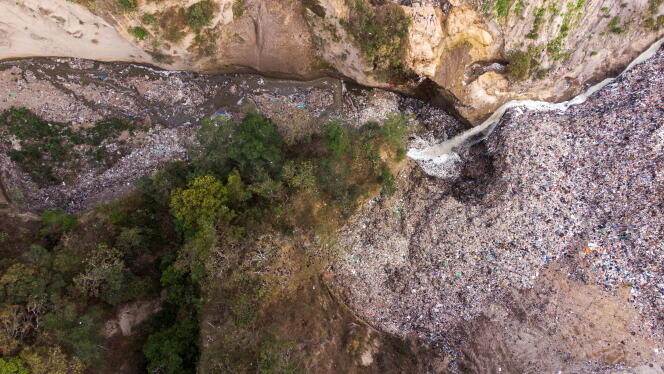


From a distance, you can make out small splashes of color lining the banks of the Las Vacas River, north of Guatemala's capital. And it's only as you get closer that you realize that these gigantic multicolored heaps are nothing other than plastic in all shapes and sizes. This hellish landscape begins at the exit of Central America's largest open-air landfill site, which for the past 70 years has accumulated over 44 hectares the waste from the inhabitants of Guatemala City and the 14 municipalities on its outskirts. Despite the city's efforts to contain this mountain of garbage, it spills over the edge of the cliffs and into the tributaries of the Las Vacas River, particularly during the rainy season.
Some 30 kilometers from the capital, this waste joins the Motagua River, the country's largest watercourse, which crosses it for 486 km to its Caribbean coast to the east. According to estimates by Guatemala's Environment Ministry, the river carries almost 8,500 tonnes of waste every year (a figure considered underestimated by NGOs) as it passes through almost a hundred municipalities, most of which use the land near its banks to put their garbage in clandestine dumps.
At the mouth of the river, on the Honduran coast this time, this sea of plastic is floating between the waves and washing up on Honduran tourist beaches. Although the situation is not new, it has only worsened in recent years, to the point where Honduras threatened to take the matter to the Inter-American Court of Human Rights in September 2022. Nine months later, and after several bilateral meetings, Honduras dropped its complaint. This was a disappointment for the mayor of the seaside town of Omoa (in the Cortès region) – one of the worst areas affected by this dumped plastic – who was counting on international justice to have his town recognized as a victim of pollution.
"It's hard to put a figure on the damage we're suffering, but it's immense," said Mayor Ricardo Alvarado, speaking to Le Monde by telephone. "Fishing, which used to be an important activity, has declined enormously because of plastic. We now make our living from tourism, but to avoid driving tourists away, we spend 100,000 lempiras (€3,707) a month collecting plastic, transporting it and burying it some 10 kilometers away." The local official, who has held the post for 13 years, says he has never done the math, but wonders "how many schools, libraries, clinics have not been built because of the money spent cleaning up the beaches?"
You have 64.07% of this article left to read. The rest is for subscribers only.
